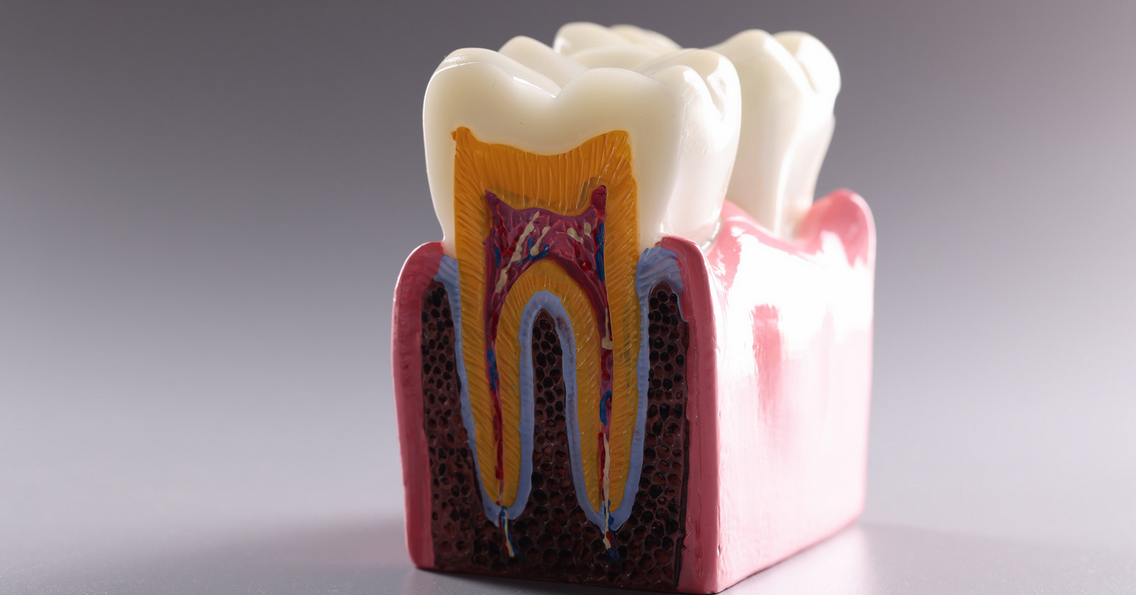
Are Sensitive Teeth a Sign of Serious Dental Problems?



Sensitive teeth can turn everyday pleasures like sipping a hot coffee or biting into an ice cream into a jarring experience, leaving many to wonder if the wince-worthy sensation indicates a hidden dental health issue. Tooth sensitivity—or dentin hypersensitivity—occurs when the enamel that protects our teeth becomes thinner or when gum recession happens, exposing the underlying surface called dentin. This can lead to a sharp, temporary pain in response to stimuli such as temperature changes, sweet or acidic foods, and even cold air. While this discomfort is common, the persistence of tooth sensitivity can impair one's quality of life, making it essential to understand its causes and whether it flags a more serious underlying dental problem. This blog aims to shed light on the enigma of sensitive teeth, offering valuable knowledge to help readers discern when to seek the guiding hand of a dentist's expertise.
Tooth sensitivity is the discomfort felt in one or more teeth as a response to specific triggers, creating a sharp and often sudden pain. Common triggers include thermal stimuli like hot or cold beverages, sweet or acidic foods, cold air, and even brushing or flossing. The sensation is typically fleeting but can be acute, making it an uncomfortable interruption to daily life.

To comprehend tooth sensitivity, it's helpful to understand basic tooth anatomy. A tooth has several layers; the hard, protective enamel is the outermost. Beneath the enamel lies the softer dentin, which contains microscopic tubules filled with nerve endings. The innermost part is the pulp, which houses the tooth's nerves and blood vessels. When enamel wears down, or the gums recede, the dentin becomes exposed, and the nerves within can react to triggers, leading to the sensation of sensitivity.
Tooth sensitivity is widespread, affecting an estimated 12.3% of the population, although the numbers could be higher due to underreporting. It can occur regardless of age but is most prevalent among individuals aged 20 to 40, with a slight increase in frequency among women. This condition underscores the importance of proper dental care and the potential need for treatment to mitigate its effects.
Enamel wear is a principal factor contributing to tooth sensitivity. It occurs due to aggressive brushing, acidic foods and beverages, and conditions like gastroesophageal reflux disease (GERD), which subjects teeth to stomach acids. Enamel erosion exposes the dentin, leading directly to sensitivity. Preventing enamel wear involves using a soft-bristled toothbrush, reducing consumption of acidic foods, and seeking treatment for medical conditions that may affect the teeth. Strengthening enamel with fluoride treatments can also mitigate sensitivity.
Gum recession reveals the roots of the teeth, removing the protective layer that covers the hypersensitive dentin. Gum disease, overzealous brushing, or genetic predisposition can lead to receded gums. Exposed roots do not have an enamel layer, making them more susceptible to sensitivity. Good oral hygiene, gentle brushing, and regular dental check-ups can help manage and prevent further gum recession.
Tooth decay and cavities create openings in the enamel, exposing and irritating the dentin and sometimes even the pulp. Bacteria in the mouth produce acids that cause decay, which, if left untreated, can deepen, increase sensitivity, and lead to more serious dental issues. Regular dental examinations, brushing, flossing, and fluoride treatments prevent cavities and the associated sensitivity.
Cracked teeth and compromised fillings can expose the tooth's dentin or pulp, leading to sensitivity. Physical trauma, bite issues, and everyday wear can cause these cracks. Identifying and addressing cracked teeth or failed fillings early is vital as they can become pathways for decay and infection, exacerbating sensitivity.
It is expected to experience some sensitivity following dental procedures such as fillings, crowns, and whitening treatments. This sensitivity is typically temporary and occurs as the tooth adjusts. Proper aftercare and communication with the dentist will help manage and expedite recovery from post-procedural sensitivity.
Understanding when to be alarmed by tooth sensitivity can save individuals from severe dental problems that require urgent attention. Normal sensitivity typically occurs sporadically, often after exposure to the known triggers and resolves quickly. However, concerning sensitivity, it is persistent or severe, occurs when eating or drinking normal-temperature foods, or is specifically localized to one tooth. This prolonged or intense pain may be a warning sign of more significant dental issues and warrants a timely consultation with a dentist. These guidelines are essential in helping readers discern between benign sensitivity and potential red flags that could indicate a need for professional dental evaluation.
Persisting or escalating tooth sensitivity can indicate more serious dental health issues such as gum disease, advanced decay, or a root infection. Gum disease, when left untreated, can lead to gum recession and further expose dentin, enhancing sensitivity and potentially leading to tooth loss. Likewise, decay can spread deep into the tooth, affecting the nerve and causing persistent pain. Root infection, or an abscess, is accompanied by extreme sensitivity and other symptoms such as swelling, a pimple on the gums, and severe pain. Any of these conditions necessitate immediate dental intervention to prevent more extensive damage and restore oral health.

Maintaining good dental hygiene is crucial in preventing and managing tooth sensitivity. Here are some daily care tips:
Alongside daily care, certain dental products are tailored for sensitive teeth:
The diet also plays a significant role. Here are some dietary recommendations:
Finally, regular dental visits are crucial:
Consuming acidic foods and beverages poses a risk to the integrity of tooth enamel, the hard, protective outer layer of the teeth. Acids can gradually wear away enamel, leaving teeth more vulnerable to decay and sensitivity. Acid erosion exposes the dentin beneath, which contains tiny tubules connecting to the tooth's nerve, leading to increased tooth sensitivity, especially when consuming hot, cold, or sweet stimuli.
A high-sugar diet is one of the key culprits behind tooth decay, which directly impacts tooth sensitivity. Sugars in foods and beverages interact with bacteria within the plaque to produce acids that can lead to cavities. As cavities penetrate the enamel, they expose the sensitive dentin, increasing discomfort and pain during eating or drinking.
To bolster dental health and reduce tooth sensitivity, it is essential to maintain a balanced diet rich in nutrients that promote strong teeth. Foods high in calcium and phosphorus, such as cheese, milk, and nuts, can help remineralize tooth enamel. Vitamin-rich fruits and vegetables, especially those containing Vitamin C, like oranges and bell peppers, can strengthen gums and reduce the likelihood of recession, reducing dentinal exposure and sensitivity. Avoiding extreme-temperature foods and eating fibrous foods that naturally clean the teeth can also contribute to a healthier, less sensitive smile.
In cases where home care is insufficient to alleviate tooth sensitivity, professional treatments may be necessary. Dental clinics offer a variety of procedures designed to reduce sensitivity and protect teeth from further damage.
Professional fluoride treatments involve the application of a high concentration of fluoride to the teeth by a dentist or hygienist. This treatment can help remineralize enamel, making it more resistant to acid attacks and preventing the progress of early decay. Fluoride can also build a protective layer over exposed dentin, thus reducing sensitivity.
Dental sealants are another form of clinical intervention that is particularly effective in preventing cavities in the grooves of the back teeth, which can lead to sensitivity. These thin coatings are applied to the chewing surfaces of molars to keep out bacteria and food particles. For cases involving exposed dentin surfaces, other protective coatings, such as bonding resins, may be applied by a dentist to shield the sensitive areas.
A surgical gum graft can be performed when gum recession is severe, and the tooth root is exposed. This involves taking tissue from elsewhere in the mouth and attaching it to the affected area, covering the exposed roots and reducing sensitivity.
For teeth with irreversible damage to the pulp, a root canal treatment may be the most effective way to eliminate sensitivity. This procedure removes the damaged nerve, cleans the tooth's interior, and seals it to prevent further infection. While root canals have a reputation for being painful, they are often no more uncomfortable than having a filling, and they can provide substantial and lasting relief from tooth pain.
Understanding these professional treatment options equips individuals with knowledge about the solutions available. Discussing symptoms and potential treatments with a qualified dental professional is crucial for the best care.
Routine dental visits prevent tooth sensitivity from escalating to more severe complications. These check-ups allow dentists to identify and address issues early, often before the patient experiences discomfort. During these visits, professional cleaning is performed, which is essential for maintaining enamel and gum health integrity. Tartar buildup, which cannot be removed by daily brushing and flossing alone, is cleared away, reducing the risk of gum disease and subsequent sensitivity. Dental professionals can also provide personalized advice and adjustments to one’s oral care routine based on the patient's specific needs, ensuring optimal dental health.
Moreover, regular check-ups facilitate the early detection of conditions contributing to sensitivity, such as cavities, cracked teeth, or early signs of gum disease. Early intervention often means simpler and less invasive treatments, effectively nipping potential problems in the bud and preserving the patient's oral health. The guidance offered by dentists during these visits is invaluable, helping patients understand how to better care for their teeth to prevent heightened sensitivity and other dental issues.
Addressing tooth sensitivity is not merely a matter of comfort—it's an essential aspect of oral health. Untreated sensitivity may not only detract from the enjoyment of everyday activities but can also signify underlying dental issues that could worsen if ignored. Reiterating the gravity of untreated tooth sensitivity, we recognize its potential to elevate into more severe dental conditions, emphasizing the importance of incorporating daily care routines, dietary considerations, and the pursuit of professional dental treatments when necessary. By maintaining regular dental check-ups, individuals ensure they manage sensitivity and proactively safeguard their overall dental health. Remember: Our teeth' health can profoundly impact our quality of life, so addressing tooth sensitivity is an investment in our well-being.
If you're in the Edmonton area, Newbury Dental is here to provide comprehensive care that prioritizes your oral health. Whether it's time for a routine visit or seeking a first appointment, our team is ready to support you on your journey to optimal dental health. Visit our Contact Page to schedule your appointment today!

We look forward to meeting you! Call 780-760-3033, email info@newburydental.ca, or request an appointment online to set up your first visit. We’ll be in touch soon!